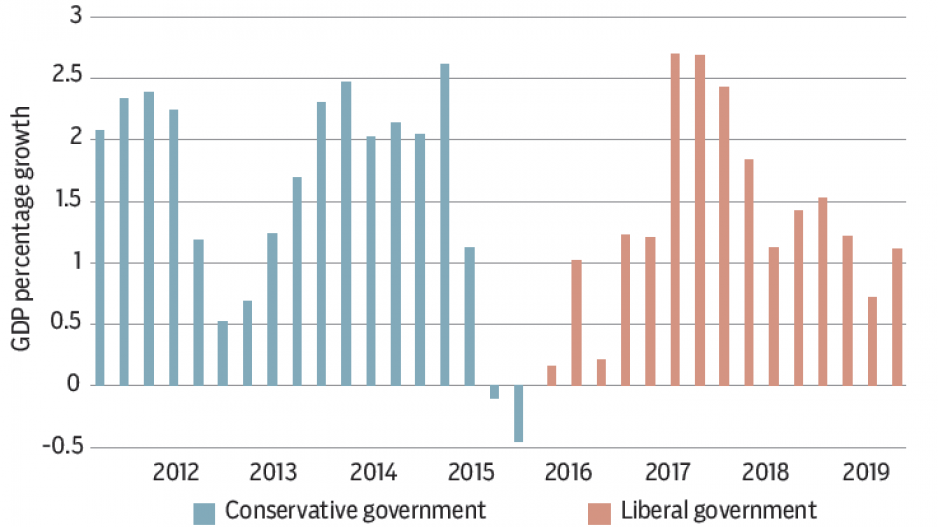When election season comes around, the amorphous idea of the economy is often front and centre in campaign ads, stump speeches and political debates. But how relevant will the economic issues be to the federal campaign when the Canadian economy is strong, th unemployment rate is low, growth is fair and deficits are relatively under control?
“We do see the economy as the No. 1 issue at 19%,” said Mario Canseco, president of Research Co. “It’s really a regional tale; it changes drastically when you look at specific regions.”
The Justin Trudeau government is in power during a strong economy, but that might not necessarily translate into electoral support. Avery Shenfeld, chief economist at CIBC, highlights that recent provincial elections in Quebec, Ontario and B.C. have not been won or lost on the broad economic numbers.
While the Canadian economy is largely doing well, the picture changes when you drill down to a provincial level. A struggling Alberta economy in recent years, largely the result of oil-market swings, has prompted 35% of Albertans to say economic concerns are the most important voting consideration this election. That is nearly twice the national average. Meanwhile in seat-rich Quebec, just 15% of voters placed the economy as the most important issue, giving it only a third-place ranking.
Alberta isn’t the only region with a struggling economy. The Atlantic provinces have been coping with slow growth for many years, though as with Quebec, the economy also ranked third among issues for Atlantic voters at 11%, behind health care and the environment.
While the economy does not seem to be taking centre stage in this election, many voters haven’t forgotten the Liberal Party of Canada’s 2015 election promise to balance the budget in its first four years. Yet while the broken vow has attracted much criticism, it has been blunted somewhat by the Conservative Party of Canada’s admission that, if elected, it will take until its second mandate to balance the budget.
“[Conservatives] are between a rock and a hard place,” said Kevin Milligan, professor of economics at the University of British Columbia. “They want to hit the Liberals on deficit management but at the same time they’re not going to move too quickly to fix it, so that’s a challenge they face.”
Canada’s top federal political parties have yet to release major policy proposals surrounding the economy, international competitiveness or tax reform. Like their provincial counterparts in Ontario, federal Conservatives are focusing their campaign on repealing the carbon tax and trying to tie that into a broader theme, the unaffordability of basic living expenses. Along those lines, the party has also announced numerous tax credits in its climate change policy, including one for energy-saving home renovations and a 5% tax cut on revenues generated from green technology patented and developed in Canada.
The Liberals have also yet to release any major economic or tax policy and seem to be running on their accomplishments over the past four years: strong economic numbers, trade deals and improved international competitiveness as a result of their recent tax changes allowing businesses to expense equipment immediately.
The NDP has proposed measures including raising taxes on Canada’s highest earners. This includes increasing the percentage of capital gains subject to tax to 75% from 50%, as it was in the 1990s, and closing loopholes including ones for stock options and tax havens.
Plans for how to handle a global downturn or ongoing trade tensions have yet to be announced. Shenfeld expects these to be issues raised during the leadership debates, but he doubts that they will colour the election in any significant way because these global issues have yet to have widespread impact on the Canadian economy.
Shenfeld said the Canadian economy has been hurt enough by the trade war to warrant an economic stimulus package and that the parties should be pressed as to their willingness to deploy one.
Canadians are more concerned about pocketbook issues and their own financial well-being than about abstract economic concepts and macro data, according to Canseco. While the economy is doing well and people have a somewhat positive outlook about their financial future, voters are less likely to focus on economic issues. What they are more likely to support are programs that directly benefit them, whether through increased spending or a reduced tax burden. With the election a month and a half away and the global economy seemingly on the edge, what is a non-issue in this election cycle could quickly become the focal point in the near future. •




